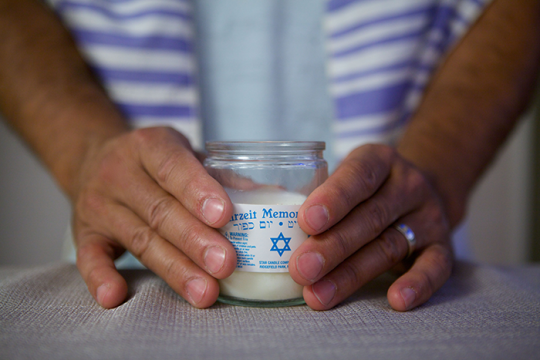
You don’t have to read very far into the biblical book of Genesis before finding a disagreement. Jacob and Esau, for example, were at odds even before they were born. The Torah tells us that “the children struggled in her (Rebecca’s) womb” (Genesis 25:22).
Hamas’ brutal attack on Israel on October 7th and Israel’s response has stirred emotions both within and outside the Jewish community. Many have strong opinions on the subject and are certain that their position is correct. As family and friends gather for holiday celebrations in the coming weeks, these differences may lead to heated discussions.
Here are a few Jewish values to keep in mind when you find yourself in the middle of a disagreement with loved ones:
Shalom Bayit (Peace in the Home)
Though this concept originally described the ideal behavior between romantic partners, it has since evolved to describe the attitudes needed to maintain a safe living space for everyone in the family. To create a sense of shalom bayit, speak from a place of kindness and compassion.
For some, conversations about Israel/Palestine will be a source of conflict. Here are a few pointers:
If you think you will disagree with a loved one, find a neutral time and place to talk.
Let the other person know that you want to listen to and digest their ideas.
One way to begin a conversation is to find places of mutual agreement, such as a shared hope for the preservation of life.
You may want to mutually agree on the length of the conversation and allow one another the ability to walk away and regroup if necessary.
Decide that it’s not a good time to engage in a discussion without having to explain.
Shmirat Hanefesh (Taking Care of One’s Soul)
This concept comes from the phrase, “v’nishmartem me’od l’nafshotehem” (take very good care of your souls) (Deuteronomy 4:15). In its original context, this was understood as avoiding unnecessary risks to one’s physical health. As we now understand the close ties between mental and physical health, we can broaden our interpretation to include taking care of our mental wellbeing.
Shmirat hanefesh in practice:
Remember that it is okay to set a loving boundary.
Take a break.
Take a walk, listen to music, or do something else that fills your soul.
Machlocket L’shem Shamayim (An Argument for the Sake of Heaven)
Families argue over little things: what to listen to on the radio, which clothing is appropriate for which occasion, etc. A disagreement over the future of the land and people of Israel is a different kind of argument and should be treated as such.
When engaged in this kind of argument, the rabbis of the Talmud would sometimes take examples to the extreme. This was meant to test the logic of their theories, not to be difficult. A machlocket l’shem shamayim is always constructive and meant to preserve the relationship. Sinat chinam (baseless hatred) is the opposite of this; it comes from a place of malice and should be called out.
Machlocket L’shem Shamayim in practice:
If you feel an argument becoming destructive, remind yourself that you have positive feelings for the other person, but disagree with their point of view.
Remember, the goal of a productive conversation is not to convince the other person, but to gain a deeper understanding of their ideas so that the disagreement does not serve as a barrier to the relationship.
Hoda’ah (Gratitude)
Even in moments when we feel tension or sadness, it is important to notice all the blessings that surround us. In Judaism, there is a tradition of saying 100 blessings every day.
Hoda’ah in practice:
Keep a gratitude journal or make a list on your phone.
Frame your day with gratitude.
Say the Modeh/Modah Ani every morning: I am thankful to God who returns my soul to me.
Watch a version of Modeh Ani from Cantors Daniel Mutlu and Jenna Pearsall of Central Synagogue in New York City.
Tikvah (Hope)
The Israeli national anthem is "HaTikvah" (the Hope). Jewish people held onto the hope of returning to the Land of Israel for more than 2000 years. Hope is a central value of Judaism. Rabbi Dr. Andrea Weiss, the provost of Hebrew Union College explains, “When we hope, we actively wait. We know it might not turn out well...yet we must build up the muscle of our heart to hope, sustain disappointment if it comes, and let ourselves hope nonetheless.”
Tikvah in practice:
Keep hoping for positive changes ahead, especially when facing challenging times.
Remember that hope is not passive; we must make choices to strive for our desired outcome.
Work to reframe negative thoughts.
Remember that hope is contagious; when you have hope, you can inspire it in others!
The Union for Reform Judaism’s core values can also help you navigate difficult conversations.
As we gather for Passover to share the story of our liberation, we pray for the safe return of those held hostage, and our hearts break for all those who suffer. We may worry that conversations around our tables this year will be fraught, or even impossible. Download a URJ seder supplement with four questions focused on conversations about Israel and having open-hearted conversations.
Talk for a Change is a Reform Movement initiative helping people have open conversations around difficult topics. Download our free Conversation Cards and Guide today!
Related Posts

Embracing Jewish Tradition to Process Trauma and Grief

Resources for Marking the Anniversary of October 7th


